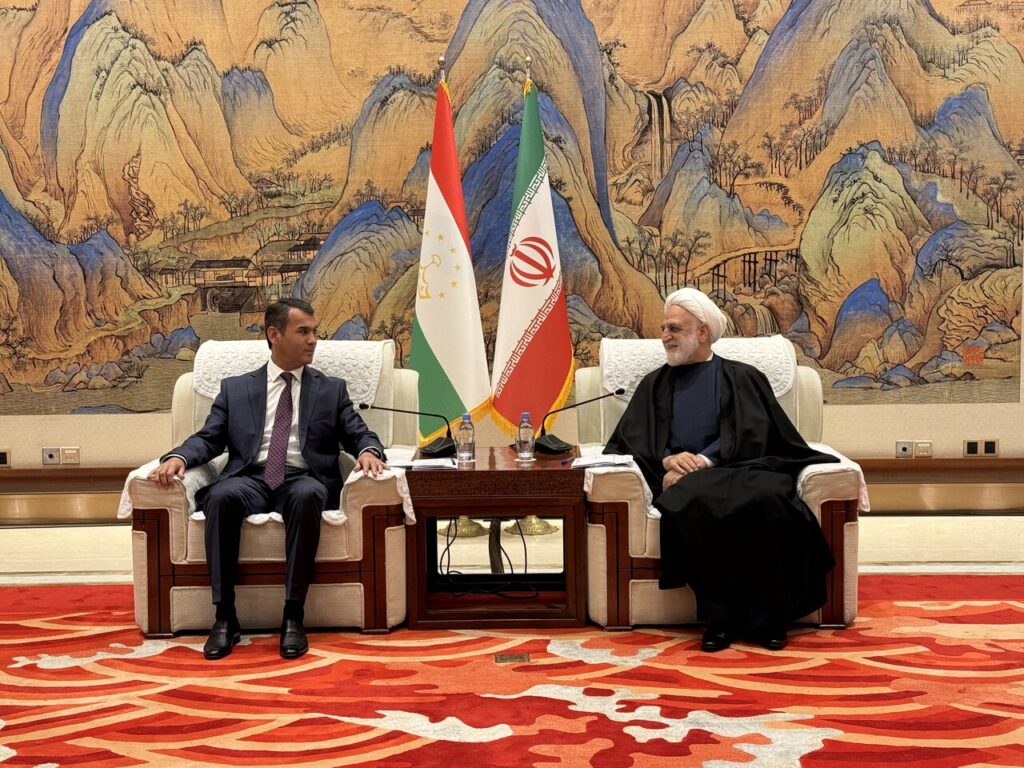TEHRAN – In a meeting with the president of China’s Supreme People’s Court, Iran’s attorney general Gollam Hossein Moseni Ejay praised the growing bilateral ties between Tehran and Beijing.
He emphasized that both countries are committed to strengthening world peace and security.
Leading a high-ranking judicial delegation, Moseni Ejay arrived in Hangzhou on Monday afternoon to attend the 20th Prime Minister’s Meeting of the Shanghai Cooperation Organization (SCO) Member States. Upon arrival he was accepted with an official welcome from Chinese officials.
During the meeting, he thanked China for holding the SCO Judicial Summit and addressing his counterparts. “Your professional background shows that it has risen at all levels of judiciary to achieve China’s highest judicial post. In this sense, I share a similar path.
Referring to the comprehensive 25-year cooperation agreement between Iran and China, Mosenieei pointed out the document as a key framework for deepening bilateral relations.
He also highlights the civilized heritage of both countries, calling it a strong foundation for expanding relations in various fields. “The current trajectory of Iran-China relations is positive and we are both trying to protect international peace and stability,” he added.
The Iranian Attorney General called for deeper legal and judicial cooperation between the two countries, citing common values and similar experiences in the face of global development.
Criticizing Western double standards on international issues, particularly issues relating to terrorism and human rights, says, “Some Western countries try to adopt a selfish definition of global agenda and try to impose narratives on other parts of the world. We must unite against such an approach.”
Mohseni-Ejei emphasized the need to strengthen cooperation among SCO members in tackling organized crime, cybercrime, drug trafficking, money laundering and terrorism. “We also should utilize public participation more effectively to counter the destabilizing efforts of certain hegemony Western states,” he said.
Condemning Israel’s actions in Gaza, he said: “For over a year and a half, the Zionist regime has deliberately targeted civilians, refugees, illnesses and children.
President of China’s Supreme People’s Court, Jang Jun welcomed the Iranian delegation and called their visit “historic and memorable.”
He acknowledged Iran’s strategic importance and expressed China’s desire for long-term relations. “Judicial cooperation is an important part of our bilateral relationship. In recent years, we have seen steady growth in this area and hope this continues,” he said.
Zhang expressed his support for strengthening economic, social and cultural ties, citing past meetings with Iranian judiciary as constructive. He welcomed Mosenieiy’s view on strengthening judicial capabilities, saying, “The world faces serious challenges such as unilateral challenges, technology misuse, terrorism and human rights abuses.
He concluded by stating that China’s biggest political and legal officer, Chen Wenquing, has maintained the importance of the visit to travel from Beijing to meet Mosenieihe.
Iran and Pakistan’s attorney general meet in Hangzhou
Later that day, Mosenie-eii met with Yahya Afridi, the Supreme Court of Pakistan. Iranian officials praised Pakistan’s constructive role in regional and global issues.
“In Iran, there is an advantageous view of Pakistan’s international involvement. As two friendly, Muslim neighbors, we can play an important role in advancing regional and global peace through joint judicial cooperation,” he said.
Iran based on good neighbors – royal judicial cooperation
Mohseni-ejei also met Emer Kerkez, president of the Turkish Cassation Court. He emphasized the deep-rooted relationship between the two countries, saying, “Iran and Turkey have always maintained broad relationships based on mutual respect and good neighbors.”
Judicial Dialogue with Uzbekistan
At another bilateral meeting, Moseni Ejay met with Bakhtiyo Islamov, the highest judicial officer of Uzbekistan. He highlighted the cultural and historical ties between the two countries, noting the need for existing agreements and more practical steps towards implementation in legal and security cooperation.
Meet with the Indian Supreme Court Justice
Mohseni-Ejei met with Dhananjaya Yeshwant Chandrachud, the Supreme Court justice of India.
“Iran firmly believes that collaboration within SCO and BRICS will help us overcome global challenges, especially in the security domain. We must expand our relationships in areas of shared interest,” he said.
Strengthen relations with Kazakhstan
In a meeting with Melgariev Islamic Beck, a senior judicial official in Kazakhstan, Moseni Ejey highlighted several bilateral plea agreements. “We emphasize the need to fully implement these contracts to improve legal cooperation,” he said.
Iran and Tajikistan: A shared perspective on cultural ties and human rights
Speaking to senior Tajik judicial officials, Mohseni-Ejei pointed to the country’s cultural and linguistic commonalities, saying, “These shared values can bring our perspective to global challenges, including human rights.
The cornerstone of judicial diplomacy SCO engagement: Deputy FM
Iran’s Deputy Foreign Minister for Law and International Affairs, Kazem Galibabadi highlighted the importance of Mosenieei’s participation in the SCO summit and highlighted the existence of all SCO Chief Justice.
He said the summit will deepen cooperation and deal with the fight against terrorism. “Some SCO members suffer from terrorism. Collective action against this is essential, and the Attorney General proposes practical strategies.”
Galibabadi also pointed to debate on legal issues surrounding unilateral sanctions. “Many SCO countries face unfair sanctions. Their judicial systems must play an important role in keeping approved states accountable.”
Another agenda item includes streamlining the extradition of criminal and prisoner relocation. “SCO members must work together to prevent fugitive offenders from crossing the border and avoiding justice,” he said.
Finally, Galibabadi focused on Iran’s proposal to create mechanisms to resolve trade disputes. “Guide can help by establishing a specialized court, given the close commercial connections between SCO members.
He concluded by highlighting Iran’s commitment to multilateralism in legal and judicial cooperation as a guide to involvement within the SCO and BRICS, not only in politics.

